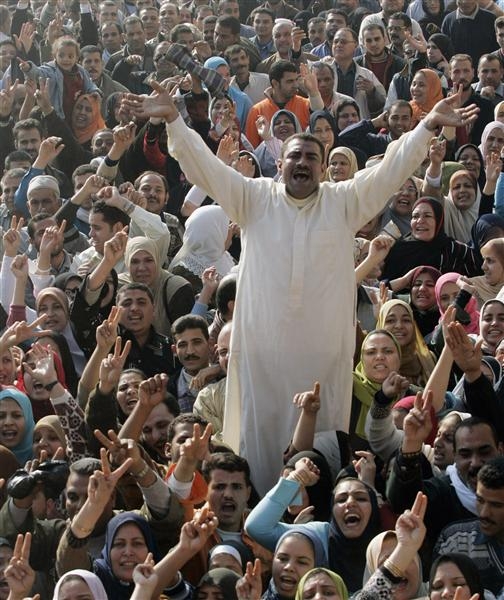Latest NEWS
- Aswat Masriya, the last word
- Roundup of Egypt's press headlines on March 15, 2017
- Roundup of Egypt's press headlines on March 14, 2017
- Former Egyptian President Hosni Mubarak to be released: lawyer
- Roundup of Egypt's press headlines on March 13, 2017
- Egypt's capital set to grow by half a million in 2017
- Egypt's wheat reserves to double with start of harvest -supply min
- Roundup of Egypt's press headlines on March 12, 2017
Egyptian workers to press for revolution's demands on Labour Day

Workers protest during a strike at the Ghazl el Mahala textile factory some 130 km (81 miles) north of Cairo in Mahala Kobra December 9, 2006. About 15,000 workers are on strike in order to demand salary increases. REUTERS/Nasser Nuri
On Wednesday, Egyptian workers will celebrate the first Labour Day since the election of President Mohamed Morsi, by voicing longstanding demands and unfulfilled promises.
A march organised by dozens of political parties, movements and labour organisations is scheduled to leave from El-Sayyeda Zeinab Square near downtown Cairo at 1pm, heading to the central Shura Council.
“Our march is demanding the enforcement of the main goal of the revolution, which is social justice,” renowned labour activist Kamal El-Fayoumi told Ahram Online.
El-Fayoumi, who took part in the uprising in the Delta city of Mahalla in 2008, added that the majority of workers in Mahalla have agreed to head to Cairo to take part in the march to the Shura Council.
Another demand on the protest agenda is the enforcement of a minimum and maximum wage, a long-held demand of Egypt’s workers. Last July, a minimum wage of LE700 ($100) was enforced, but only for permanent government workers. Workers have long demanded a minimum wage set at LE1,200 ($170).
“We are also demanding the return of companies that were stolen under the rule of Mubarak, and the government still refuses to renationalise them. They continue to prove to us that they’re a crippled, failed government,” added El-Fayoumi.
According to a report issued by the Egyptian Centre for Social and Economic Rights (ECSER) in April 2013, the labour movement and the centre’s lawyers have succeed in winning court verdicts that ordered the return of several privately-owned companies such as the department store Omar Effendi, electronic and engineering company Delta Industries, Assiut Cement, Nile Ginning Cotton, Shebin El-Kom Textiles, and Tanta Flax and Oil to the public sector.
The report, however, accuses the government of refusing to implement the court verdicts.
On their national day, workers will also demand the establishment of an independent and free syndicate that represents them, instead of what El-Fayoumi refers to as “fraudulent syndicates from Mubarak’s time.”
“But above all of this, we stress the need to form a revolutionary government that represents the entire political spectrum, and all the loyal forces that took part in the revolution,” El-Fayoumi argues.
“We did not get rid of the dictatorship of the National Democratic Party to be replaced with a worse dictatorship of the Freedom and Justice Party,” he said, referring to the Muslim Brotherhood-dominated cabinet.
According to labour activist and board member of the Egyptian Federation of Independent Trade Unions Fatma Ramadan, the march to the Shura Council, the body which holds legislative powers, is to symbolise the workers’ rejection of legislation directed against their interests.
Last November, President Mohamed Morsi amended law 35 of 1976 which regulated trade unions. The amended law was widely perceived by workers as an attempt to oppress the labour movement, as it gives unprecedented authority to the Muslim Brotherhood-oriented Minister of Manpower Khaled El-Azhary to appoint the heads of professional syndicates.
Ramadan further added that more events, including protests, conferences and workshops, are expected to take place in May.
According to the ECSER report, the number of protests, including marches, strikes, hunger strikes, and politically-motivated suicide attempts that took place in 2012 reached 3,817, in comparison with the 3,313 incidents which took place between the years 2000 and 2010.
“This reflects the amount of frustration that has hit the working class one year after the revolution,” read the report.
The march on Wednesday has been called for by several labour entities, including the Egyptian Federation of Independent Trade Unions, Egypt’s Workers Democratic Conference and the Coordinating Committee for Trade Unions’ Freedom and Rights.
Also taking part are several political movements such as the Youth for Freedom and Justice, No to Military Trials, the Drop Egypt’s Debts campaign, the Egyptian Centre for Economic and Social Rights, the Egyptian Initiative for Personal Rights and the Revolutionary Socialists.
Political parties will also be featured, including the Constitution Party, the Socialist Popular Alliance, the Egyptian Social Democratic Party, the Strong Egypt Party, the Communist Egyptian party, Al-Tagammu Party, Al-Karama Party, and the Workers and Peasants Party.
A ceremony celebrating Labour Day is to be held on Tuesday evening at Al-Qoba presidential palace in Cairo's Heliopolis district and will be attended by President Morsi. However, the Egyptian Federation of Independent Trade Unions has refused to take part in the ceremony.
"This ceremony is undermining the importance of the workers. It is the president who should go to the workers and not vice versa," head of the federation Kamal Abou Eita told Ahram Online.
Abou Eita further called on workers not to attend the ceremony, urging them to join the march to the Shura Council then head to Tahrir Square on Wednesday instead.
"The president doesn't even listen to our demands. If he is a real president then he should come to us and tell us his plan," said Abou Eita.










